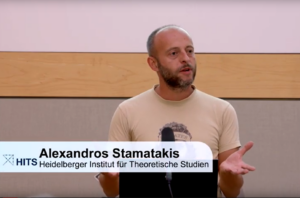Computational Molecular Evolution
18–29 May 2024
Wellcome Genome Campus, UK
Hands-on training in the latest methods and skills for molecular evolutionary analysis of sequence data
Summary
Run biennially at the Wellcome Genome Campus, this hands-on computational course aims to provide early-career stage researchers with the theoretical knowledge and practical skills to carry out molecular evolutionary analyses on sequence data. The previous iteration of this course was run in Heraklion, Greece, 2023.
In addition, the course will offer a unique opportunity for direct interaction with some of the world-leading scientists and authors of famous analysis tools in phylogenomics and population genomics.
The demand for such training is large and growing, as are the sequence datasets and researchers’ awareness of the important insights that can be gained from phylogenetic and molecular evolutionary techniques.
Target audience
Experience from previous years has led to preference being given to candidates who:
- are doctoral students and postdocs in the early stages of their research career;
- already have some familiarity with phylogenetic methods (i.e. have already used some of the relevant tools);
- have already collected/assembled a molecular sequence dataset to analyse in their work;
- are instructors teaching a molecular evolution course to biology students.
We accept a mixture of bioinformaticians and empirical biologists to encourage interactions between the disciplines.
The course is also suitable for established researchers and instructors who would like to further their understanding of statistical methods and computational algorithms that underlie modern phylogenetic and population genetic software tools such as RAxML-NG, MrBayes/RevBayes, PAML, BEAST, and BPP.
Programme
Programme:
The overall objective is to raise the standard of research that uses statistical methods and software programs in the field of molecular evolution and phylogenetics, by providing high-quality, in-depth, face-to-face training on this topic for as many researchers as possible.
The extensive programme comprises a mixture of lectures and computer practicals covering the following topics:
- Overview of phylogenetic terminology, methods and analyses
- Multiple sequence alignment
- Markov models of nucleotide, amino acid, and codon substitution
- Phylogeny reconstruction (including maximum likelihood and Bayesian methods)
- Hypothesis testing and computer simulation
- Coalescent and multispecies coalescent
- Analysis of genomic data under multispecies coalescent
- Protein and nucleotide sequence analysis
Learning Outcomes
By the end of the course participants will have an improved theoretical understanding of relevant methods in phylogenomics and population genomics and will be able to:
- Critically interpret and apply relevant techniques to their evolutionary research.
- Interpret evolutionary trees and recognise the power of molecular phylogenies for understanding real-world biological questions, relating to evolutionary history, current-day biodiversity and future diversification of living organisms.
- Extract genome sequence data from public databases, and create multiple sequence alignments.
- Employ appropriate bioinformatics skills for analysing genome-scale datasets, including linux command line, shell scripts, and compiling and running specialist programs.
- Select and apply phylogenetic software packages (such as RAxML-NG, PAML, MrBayes, BEAST, BPP) to infer phylogenetic trees, estimate species divergence times, and test phylogenetic hypotheses.
- Explain the underlying principles of major phylogenetic methods such as distance matrix-based, maximum likelihood, and Bayesian methods, including the MCMC method.
- Explain the use of Markov models of nucleotide, amino acid and codon substitution, hypothesis testing using the likelihood ratio test, coalescent and multispecies coalescent models in species tree estimation and species delimitation.
- Apply likelihood ratio tests to infer the existence and location of molecular adaptation affecting protein-coding genes.
- Estimate species trees, delimit species boundaries and estimate the time and rate of between-species gene flow using coalescent-based analyses of genomic sequence data.
Additional Sessions
The training team will also organise ad hoc sessions on special topics during the course depending on the interests of the participants. These will be led by course instructors or teaching assistants. Ad hoc sessions in past courses have included introductions to source control using github, high-performance computing (HPC), calculation of Bayes factors, and gene-tree species-tree reconciliation.
Please note: This course focuses on molecular evolutionary and phylogenetic analyses of molecular sequence data, including genomic data generated using next-generation sequencing (NGS) technology. This course does not cover pre-processing of NGS data such as read mapping, variant calling, or genome assembly.
Instructors and speakers
Lead Instructors and Organisers

Aglaia (Cilia) Antoniou
Institute of Marine Biology, Biotechnology and Aquaculture, Hellenic Centre for Marine Research (IMBBC, HCMR), Heraklion, Greece

Adam Leaché
University of Washington, USA

Alexandros Stamatakis
Institute of Computer Science Foundation for Research and Technology, Hellas, Heraklion, Greece

Ziheng Yang
University College London, United Kingdom
Training Team

Rachel Warnock
University of Erlangen-Nuremberg (FAU), Germany

Kabita Baral
University of Calgary, Canada

Jūlija Pečerska
Zurich University of Applied Sciences (ZHAW), Switzerland

Maria Anisimova
Zurich University of Applied Sciences (ZHAW), Switzerland

Sandra Álvarez-Carretero
University of Britsol United Kingdom

Bastien Boussau
CNRS, LBBE, France

Jeffrey Thorne
North Carolina State University, USA

Dimitri Höhler
Heidelberg Institute for Theoretical Studies, Germany

Asif Tamuri
University College London, United Kingdom

Charlotte Wright
Wellcome Sanger Institute, United Kingdom

Anna Nagel
University of California, Davis, United States

Paschalia Kapli
Natural History Museum, London, UK

Benjamin Redelings
Tulane University, United States

Bruce Rannala
University of California, Davis, United States

Michael May
University of California, Davis, United States
Guest Speakers

Nick Goldman
EMBL-European Bioinformatics Institute

Joana Meier
Wellcome Sanger Institute, United Kingdom
How to apply
Prerequisites
While the course will predominantly rely upon command-line programs, knowledge of Unix/Linux commands is not a prerequisite for this course. Participants who are selected for this course will be required to complete pre-course exercises using Unix/Linux commands.The information about these pre-course exercises will be provided to the successful applicants.
How to Apply
Please click the Apply button above to begin the online application process. Places are limited and will be awarded on merit. If you have any problems with the online application process, please contact us.
Please note: Applications must be supported by a recommendation from a scientific or clinical sponsor (e.g. supervisor, line manager or head of department) merely stating their support for the applicant to attend the course and potential funding, if available – no lengthy standard recommendation letters are required. A request for a supporting statement will be sent to the nominated sponsor automatically during the application process. Applicants must ensure that their sponsor provides this supporting statement by the application deadline. Applications without a supporting statement will not be considered.
Travel visas
Successful applicants will be provided with a support letter for their visa application, if required.
Please visit the following websites for further information on visiting the UK:
Cost
| Cost | Accommodation / meals | |
| *Course fee | £1900 | This is a residential course and the fee includes all accommodation and meals. |
*The course fee is subsidised by Wellcome Connecting Science and applies to non-commercial applicants. Please contact us for the commercial fee.
Bursaries
Limited bursaries are available (up to 50% reduction on the course fee) and are awarded on merit. If you would like to apply for a bursary, please complete the bursary section of the online application form.
Where there are many bursary applications, the selection committee may issue smaller amounts.
Bursaries can be applied for as part of the course application form. Applicants will be notified of a bursary award along with their place on the course, usually within one month of the application deadline. The decision of the selection committee is final.
Please note that both the applicant and sponsor are required to provide a justification for the bursary as part of the application.
Extra accommodation
If you wish to book onsite accommodation either side of the course dates, please contact the Conference Centre directly.
Additional funding opportunities
Visit our support page for additional financial support currently available.
Accommodation services phishing scam – please be vigilant. More information.

